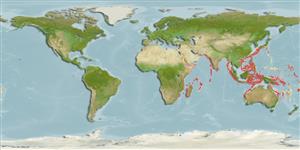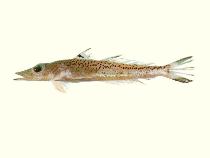Bembrops platyrhynchus (Alcock, 1894)
Natal duckbill| Native range | All suitable habitat | Point map | Year 2050 |

|
| This map was computer-generated and has not yet been reviewed. |
| Bembrops platyrhynchus AquaMaps Data sources: GBIF OBIS |
Pictures | Google imageBembrops platyrhynchus
Picture by CSIRO
Classification / Names Common names | Synonyms | Catalog of Fishes(genus, species) | ITIS | CoL | WoRMS | Cloffa
Etymology: Bembrops: Greek, bembras, -ados = a kind of anchovy m+ Greek, ops = appearance (Ref. 45335); platyrhynchus: Specific name from the Greek 'platys' meaning flat and 'rhynchos' meaning snout or beak.
More on author: Alcock.
Issue
Hoese and Bray (2006: in Ref. 75154) reccognize Bembrops philippinus as valid. It seems no new information has been published since under that name, or under Bembrops platyrhynchus.in the Philippines. Please send papers we missed, or more studies are needed.
Environment: milieu / climate zone / depth range / distribution range Ecology
Distribution Territories | FAO areas | Ecosystems | Occurrences | Point map | Introductions | Faunafri
Size / Weight / Age
Short description Identification keys | Morphology | Morphometrics
Body shape (shape guide): elongated.
Life cycle and mating behavior Maturity | Reproduction | Spawning | Eggs | Fecundity | Larvae
Main reference
Upload your references | References | Coordinator | Collaborators
CITES
Threat to humans
Human uses
More information
Food items (preys)
Diet composition
Food consumption
Food rations
Predators
Growth parameters
Max. ages / sizes
Length-weight rel.
Length-length rel.
Length-frequencies
Mass conversion
Recruitment
Abundance
Reproduction
Maturity
Maturity/Gills rel.
Fecundity
Spawning
Spawning aggregations
Eggs
Egg development
Larvae
Larval dynamics
Gill area
Brain
Otolith
Body composition
Nutrients
Oxygen consumption
Swimming type
Swimming speed
Visual pigments
Fish sound
Diseases & Parasites
Toxicity (LC50s)
Genome
Genetics
Heterozygosity
Heritability
Genetic Diversity
Aquaculture systems
Aquaculture profiles
Strains
Ciguatera cases
Stamps, coins, misc.
Tools
Special reports
Download XML



